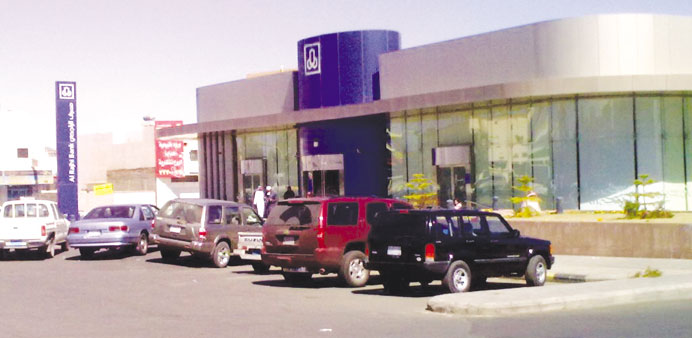Profit at the Riyadh-based Al Rajhi is slowing even as the Saudi economy is poised to grow 4.2% this year, because rival banks are increasingly turning their attention to retail customers as new labour laws stifle construction projects.
The world’s biggest Islamic bank is losing ground to peers in Saudi Arabia, its home market, as slowing credit growth and intensifying competition for retail customers weigh on earnings.
Al Rajhi Bank said this week that first-quarter profit fell 17% from a year earlier, its third quarter of declining earnings. Lending growth in the three months slowed to 7% from 19% in the same period of 2013. That compares with 30% for Bank Albilad and 11% for Samba Financial Group.
Profit at the Riyadh-based bank is slowing even as the Saudi economy is poised to grow 4.2% this year, because rival banks are increasingly turning their attention to retail customers as new labour laws stifle construction projects. Construction lending accounted for 7.7% of total bank loans in 2013, according to NCB Capital.
“There is increased rivalry for retail loans business, and the pricing is starting to tighten,” Jaap Meijer, executive director at Arqaam Capital Ltd in Dubai, said by phone on Tuesday. “Smaller Islamic banks like Bank AlJazira, Albilad and Alinma Bank are targeting the same pool and are growing faster.”
The net interest margin on Al Rajhi’s retail loans, or the difference between what the bank earns on assets such as loans and what it pays on liabilities such as deposits, declined last year to 6.2% from 7.3% as competition increased, NCB Capital said in a March note. Lending to individuals made up about 73% of the bank’s total loans last year, according to its financial results.
“Signs are appearing of a loosening grip on the retail segment that was dominated by Rajhi until just a few quarters ago,” Riyad Capital analysts Asim Bukhtiar and Ibrahim Al Harbi wrote in a research report on April 13. “Margins are under severe pressure.”
In the corporate segment, Al Rajhi didn’t rank within the top 37 banks as an arranger for syndicated loans in the Middle East and North Africa in the first quarter, data compiled by Bloomberg show, while Samba, Banque Saudi Fransi and National Commercial Bank held the top positions.
A spokesman for Al Rajhi said he was unable to immediately comment when contacted by phone on Tuesday.
Growth of total performing loans in Saudi Arabia slowed to 12% last year from 18% in 2012, according to NCB Capital. The country started deporting undocumented migrants in April 2013 in an effort to create jobs for citizens. “Labour issues” have slowed construction activity, NCB Capital said.
“The slowdown in lending is seen across all local banks, not just Al Rajhi,” Mohammed al-Omran, president of the Gulf Center for Financial Consultancy in Riyadh, said by phone on Tuesday. “We will be seeing an acceleration in lending growth” by the second half of the year, he said.
The biggest Islamic bank by assets in the world said this week first-quarter profit fell to 1.7bn riyals ($456mn) from 2.1bn riyals a year earlier as expenses increased. Al Rajhi’s return on assets, a measure of profitability, plunged to 2.7% at the end of last year from 3.2%, according to data compiled by Bloomberg. That compares with 7.3% in 2006 and a low of 2.6% in 2002.
“Will there be more pain ahead?” Bukhtiar and al-Harbi asked in the Riyad Capital report. “Lack of announcements from the lender has made this difficult to answer and adds to our concern.”

